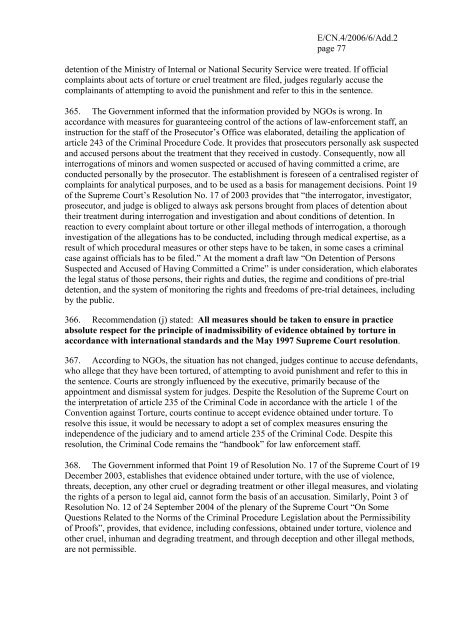E Economic and Social Council - acnudh
E Economic and Social Council - acnudh
E Economic and Social Council - acnudh
Create successful ePaper yourself
Turn your PDF publications into a flip-book with our unique Google optimized e-Paper software.
E/CN.4/2006/6/Add.2<br />
page 77<br />
detention of the Ministry of Internal or National Security Service were treated. If official<br />
complaints about acts of torture or cruel treatment are filed, judges regularly accuse the<br />
complainants of attempting to avoid the punishment <strong>and</strong> refer to this in the sentence.<br />
365. The Government informed that the information provided by NGOs is wrong. In<br />
accordance with measures for guaranteeing control of the actions of law-enforcement staff, an<br />
instruction for the staff of the Prosecutor’s Office was elaborated, detailing the application of<br />
article 243 of the Criminal Procedure Code. It provides that prosecutors personally ask suspected<br />
<strong>and</strong> accused persons about the treatment that they received in custody. Consequently, now all<br />
interrogations of minors <strong>and</strong> women suspected or accused of having committed a crime, are<br />
conducted personally by the prosecutor. The establishment is foreseen of a centralised register of<br />
complaints for analytical purposes, <strong>and</strong> to be used as a basis for management decisions. Point 19<br />
of the Supreme Court’s Resolution No. 17 of 2003 provides that “the interrogator, investigator,<br />
prosecutor, <strong>and</strong> judge is obliged to always ask persons brought from places of detention about<br />
their treatment during interrogation <strong>and</strong> investigation <strong>and</strong> about conditions of detention. In<br />
reaction to every complaint about torture or other illegal methods of interrogation, a thorough<br />
investigation of the allegations has to be conducted, including through medical expertise, as a<br />
result of which procedural measures or other steps have to be taken, in some cases a criminal<br />
case against officials has to be filed.” At the moment a draft law “On Detention of Persons<br />
Suspected <strong>and</strong> Accused of Having Committed a Crime” is under consideration, which elaborates<br />
the legal status of those persons, their rights <strong>and</strong> duties, the regime <strong>and</strong> conditions of pre-trial<br />
detention, <strong>and</strong> the system of monitoring the rights <strong>and</strong> freedoms of pre-trial detainees, including<br />
by the public.<br />
366. Recommendation (j) stated: All measures should be taken to ensure in practice<br />
absolute respect for the principle of inadmissibility of evidence obtained by torture in<br />
accordance with international st<strong>and</strong>ards <strong>and</strong> the May 1997 Supreme Court resolution.<br />
367. According to NGOs, the situation has not changed, judges continue to accuse defendants,<br />
who allege that they have been tortured, of attempting to avoid punishment <strong>and</strong> refer to this in<br />
the sentence. Courts are strongly influenced by the executive, primarily because of the<br />
appointment <strong>and</strong> dismissal system for judges. Despite the Resolution of the Supreme Court on<br />
the interpretation of article 235 of the Criminal Code in accordance with the article 1 of the<br />
Convention against Torture, courts continue to accept evidence obtained under torture. To<br />
resolve this issue, it would be necessary to adopt a set of complex measures ensuring the<br />
independence of the judiciary <strong>and</strong> to amend article 235 of the Criminal Code. Despite this<br />
resolution, the Criminal Code remains the “h<strong>and</strong>book” for law enforcement staff.<br />
368. The Government informed that Point 19 of Resolution No. 17 of the Supreme Court of 19<br />
December 2003, establishes that evidence obtained under torture, with the use of violence,<br />
threats, deception, any other cruel or degrading treatment or other illegal measures, <strong>and</strong> violating<br />
the rights of a person to legal aid, cannot form the basis of an accusation. Similarly, Point 3 of<br />
Resolution No. 12 of 24 September 2004 of the plenary of the Supreme Court “On Some<br />
Questions Related to the Norms of the Criminal Procedure Legislation about the Permissibility<br />
of Proofs”, provides, that evidence, including confessions, obtained under torture, violence <strong>and</strong><br />
other cruel, inhuman <strong>and</strong> degrading treatment, <strong>and</strong> through deception <strong>and</strong> other illegal methods,<br />
are not permissible.
















